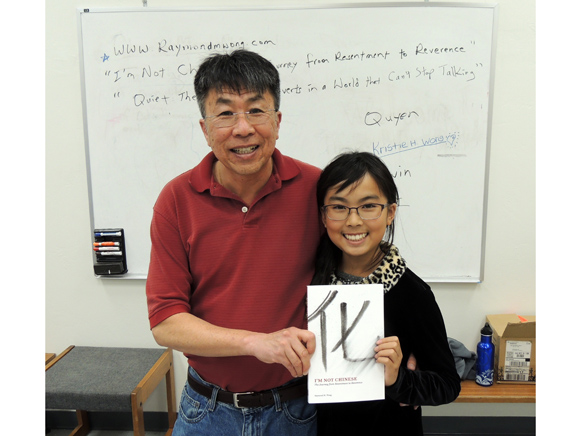For Raymond Wong, a resident of Rancho San Diego, writing a memoir was a life-changing experience. His book titled, “I’m Not Chinese: Moving from Resentment to Reverence” is a compelling account of how he rectified his past after a life-changing trip to Hong Kong with his mother.
At the San Carlos Library, Wong talked about the book. He read aloud the first few paragraphs of his memoir.
For Raymond Wong, a resident of Rancho San Diego, writing a memoir was a life-changing experience. His book titled, “I’m Not Chinese: Moving from Resentment to Reverence” is a compelling account of how he rectified his past after a life-changing trip to Hong Kong with his mother.
At the San Carlos Library, Wong talked about the book. He read aloud the first few paragraphs of his memoir.
“Do you hear the resentment I had?” he asked the audience, which included Carlene Hemric of Friends of the Library.
“I wrote that when I was 33 years old. I’m sorry now about my attitude back then. This book is about how this man—the narrator, me—went from resentment to a way of accepting his past,” he said.
When Wong was 5 years old in the late 1960s, his mother moved away with his brother and sister and came to American in search of a better life, leaving behind a husband.
Wong said he had always been shy and withdrawn, but the English-speaking schools, first in Vancouver, then San Francisco and finally in San Diego, put him even more at unease.
“Kids are brutal with other kids who are different,” he said, to the nodding agreement of the people listening.
“They thought I looked funny. They suspected my Asian heritage. When they asked me where I was from, I would say I was British. It was sort of true because at the time Hong Kong was a colony of Britain,” said Wong, who is an academics counselor at San Diego City College.
When Wong’s mother married a Caucasian man named Roger, the tension for Wong stepped up even more.
“Roger and I were never close. I always had my face buried in a book. So even in my own family, I felt like an outsider,” he said.
Wong Nan Kit was his Chinese name, so he changed it to Raymond, then later shortening it to Ray. Essentially, Wong tried to escape everything about him and his background that was Chinese. He kept his head buried in books. Fortunately, he took a Creative Writing class at Grossmont College. The teacher, Glenda Richter, helped change the course of his life.
“She encouraged me in my writing,” Wong said.
Wong had always liked to write, and the trip he took to Hong Kong with his mother changed the course of his life. On that trip, he met with father and other relatives, but because Wong had not kept up his Cantonese, he could not have a conversation with any of them.
“I realized that I had left behind a lot of my background and my identity all those years I was adamant about not being Chinese,” he said.
Over the course of the three weeks he was face to face with the Chinese culture in his mother’s hometown where her parents were buried.
“I saw the tears streaming down her face as she prayed to them at the cemetery. Then I, too, prayed and asked for forgiveness,” Wong said.
When he returned from the trip, Wong began writing. He would write an hour before he went to work. Then after he finished the work, he revised—again and again.
“That’s where the real work is, page by page, line by line, word by word,” he said.
After about five years of rewriting and revising his memoir, he went to writers’ conferences and started sending out his manuscript.
“And getting lots of rejection letters. It’s just part of the process,” he said.
His persistence in revising and sending the manuscript lasted 18 years before Florida Press, a small press out of Loyola University, published his book in October of last year.
“Some dreams do come true—if you are willing to work at it,” he said, motioning to his 11-year-old daughter Katie, who was sitting up front with him.
“I have a dream of getting married and having children and becoming a biochemist,” Katie stated.
It’s good to have a dream, to have something to aspire to, Wong said.
“Think about an action that you can make that will move you closer to your own dream,” he said. “My own dream now is to have my book used in college classes like Asian Studies and English Composition.
Also important in making a dream come true is to acknowledge your own past and come to terms with your background, said Wong. As a father, he makes sure that his daughter and 13-year-old son Kevin keep in touch with the culture of China. He also encourages them to get to know the Vietnamese culture of their mother.
Wong has come full circle in accepting, even revering his past and has also written short stories in the “Chicken Soup for the Soul” series of books. In one of the books, “Thanks, Dad,” Wong wrote a story about how his stepfather gave him a bike one year for Christmas, running alongside Wong until he could ride the bike by himself.
In Wong’s long ride to personal achievement, he discovered his own definition of success. “It’s not just about publishing a book or receiving accolades or a certain status in life. For me, success is making a difference,” he said.
Wong’s memoir can be purchased at Amazon.com and at his book signings. Check his schedule at www.raymondwong.com.













